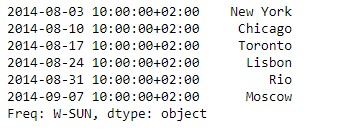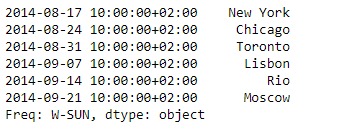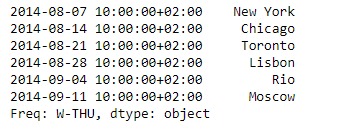Pandas 系列是带有轴标签的一维ndarray。标签不必是唯一的,但必须是可哈希的类型。该对象同时支持基于整数和基于标签的索引,并提供了许多方法来执行涉及索引的操作。
Pandas Series.tshift()函数用于移动时间索引,并使用时标的频率(如果有)。如果未指定freq,则它将尝试使用索引的freq或inferred_freq属性。如果这些属性都不存在,则会引发ValueError。
用法: Series.tshift(periods=1, freq=None, axis=0)
参数:
periods:移动的周期数,可以是正数或负数
freq:从tseries模块或时间规则中使用的增量(例如“ EOM”)
axis:对应于包含索引的轴
返回:移动:NDFrame
范例1:采用Series.tshift()函数将给定系列对象的基于Datetime的索引移动一定的时间。
# importing pandas as pd
import pandas as pd
# Creating the Series
sr = pd.Series(['New York', 'Chicago', 'Toronto', 'Lisbon', 'Rio', 'Moscow'])
# Create the Datetime Index
didx = pd.DatetimeIndex(start ='2014-08-01 10:00', freq ='W',
periods = 6, tz = 'Europe/Berlin')
# set the index
sr.index = didx
# Print the series
print(sr)输出:

现在我们将使用Series.tshift()函数将索引按系列对象已应用的频率移动2个周期。
# shift by 2 periods
sr.tshift(periods = 2)输出:

正如我们在输出中看到的,Series.tshift()函数已成功将给定系列的基于DateTime的索引移动了2个周期。
范例2:采用Series.tshift()函数可将给定系列对象的基于DateTime的索引增加一定的时间,并在其上应用“每日”频率。
# importing pandas as pd
import pandas as pd
# Creating the Series
sr = pd.Series(['New York', 'Chicago', 'Toronto', 'Lisbon', 'Rio', 'Moscow'])
# Create the Datetime Index
didx = pd.DatetimeIndex(start ='2014-08-01 10:00', freq ='W',
periods = 6, tz = 'Europe/Berlin')
# set the index
sr.index = didx
# Print the series
print(sr)输出:

现在我们将使用Series.tshift()该函数可将序列对象已应用频率上的索引增加4个周期。
# increment by 4 periods
sr.tshift(periods = 4, freq = 'D')输出:

正如我们在输出中看到的,Series.tshift()函数已成功将给定系列的基于DateTime的索引增加了4个周期。
相关用法
- Python pandas.map()用法及代码示例
- Python Pandas Series.max()用法及代码示例
- Python Pandas Series.min()用法及代码示例
- Python Pandas.to_datetime()用法及代码示例
- Python Pandas Dataframe.iat[ ]用法及代码示例
- Python Pandas Series.dt.tz用法及代码示例
- Python Pandas TimedeltaIndex.name用法及代码示例
- Python Pandas Dataframe.pop()用法及代码示例
- Python Pandas.melt()用法及代码示例
- Python Pandas Series.lt()用法及代码示例
- Python Pandas Timestamp.day用法及代码示例
- Python Pandas Series.gt()用法及代码示例
- Python Pandas Series.last()用法及代码示例
- Python Pandas Series.ne()用法及代码示例
- Python Pandas Series.ge()用法及代码示例
注:本文由纯净天空筛选整理自Shubham__Ranjan大神的英文原创作品 Python | Pandas Series.tshift()。非经特殊声明,原始代码版权归原作者所有,本译文未经允许或授权,请勿转载或复制。
